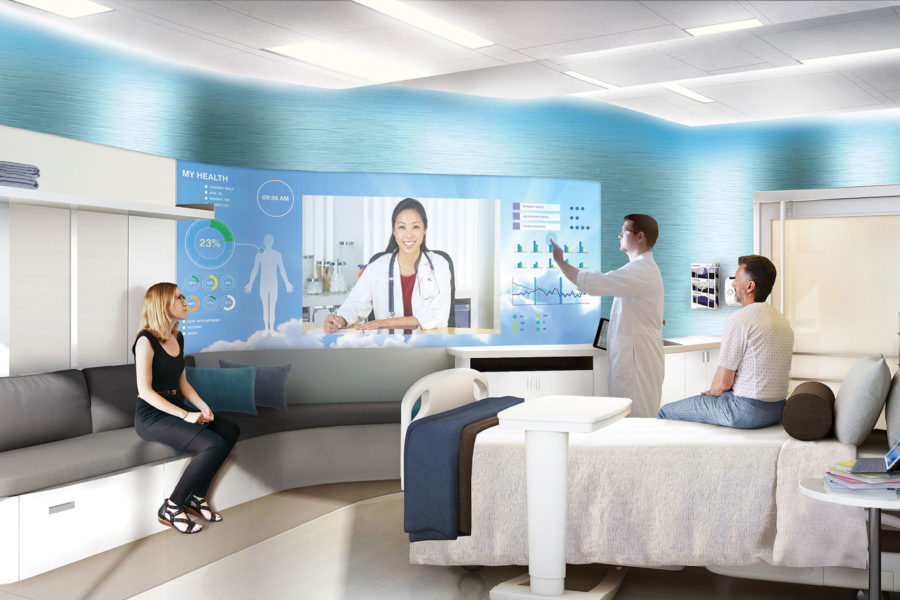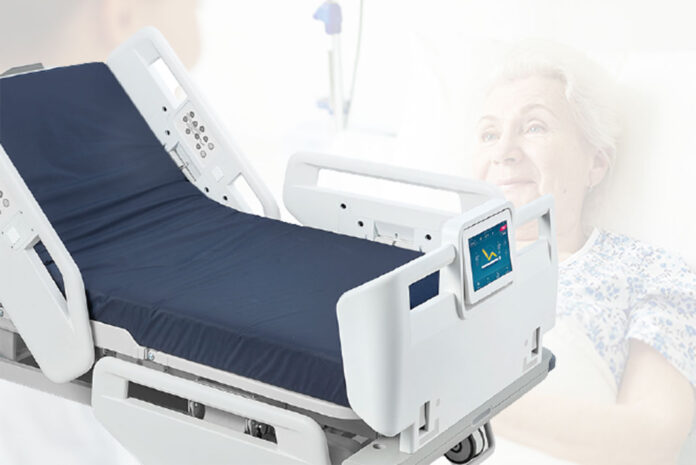Modern hospitals pay great attention to providing a comfortable environment for the patient by being in a comfortable room that contributes to improving his movement and helps care givers to provide healthcare through the provision of high-performance smart bed systems that help the doctor and the nursing staff to obtain the most accurate details of the case and read the vital functions of the patient Remotely.
Smart hospital beds are part of the cycle of technological development that is spreading in the corridors of hospitals because of its role in improving cooperation between the medical care team, elevating the level of patient safety and care, in addition to improving operational efficiency.
Smart technologies and medical equipment are invading hospitals until the health sector has become one of the sectors that have benefited the most from successive developments, whether at the level of technology or at the level of medical and surgical achievements.
The development in this field is not limited to operating rooms or diagnostic capabilities and treatment.
Rather, it extends to administrative work inside the corridors of hospitals and health centers, including the patient’s bed and his medical data, which were transformed from manual to electronic.

The advanced smart hospital beds provided an innovative concept through the advantages of contacting the treating medical team, in addition to the ability to collect data and send it to the main information center in the hospital.
Smart hospital beds are one of the advanced technologies deployed in hospitals and medical centers at the level of the Gulf countries and the Middle East region, as they have played an important role in raising their efficiency and improving the level of services in them, as well as helping medical personnel and healthcare providers to perform the tasks entrusted to them to the fullest, thus contributed to reducing the percentage of medical errors in hospitals.
The smart bed is one of the hundreds of applications of the internet of medical things (IOMT), this new technology is able to transform a lot of medical equipment into a smart equipment that can interact with its surroundings, it can send and receive data and sometimes analyze and give results.
What Smart Hospital Beds Can Do
The smart bed today can monitor the patient’s condition through sensor chips that work to monitor the patient’s breathing, pulse, and temperature provided that this information is transferred to a special computer device in the doctor’s room supervising the patient.
The device can also clarify the data without confusing the general state of health with the sudden deterioration that the patient is exposed to, such as exposure to sudden stroke or heart attack, which saves the patient the speed of direct physician intervention.
The doctor, through his computer, can know the smallest details even in severe cases such as stroke or heart attack.
There is an iPad attached to each bed that displays all alerts and medical status of the resident patient, so that alert signs and medical status indicators are displayed on the screen for each patient, allowing medical care staff to monitor the patient’s condition remotely.
If you’re interested in how smart hospital beds and hospital rooms can improve patient care, you’ll be intrigued to learn about the latest advancements in oxygen supply. Find out more about how these technological innovations are making a real difference in the lives of patients and healthcare providers alike.
Smart hospital beds have an innovative feature as they can determine if the bed is busy or if the patient is trying to get up. It may also adjust itself to ensure proper position and support for the patient.
There are Sensors under the mattresses of the bed that can monitor the health of the patients, and other wireless devices such as wearable heart monitors.
Also, modern hospital beds are able to distinguish the patient exit from the bed alarm, as a pressure cushion is placed on the arms of the bed to give an alert when the patient gets out of bed. And soon, the nursing staff realizes this movement after the alarm goes off from the bed.
Smart hospital beds are one of the advanced smart technologies deployed in hospitals and medical centers at the level of the Gulf countries and the Middle East region, as they played an important role in raising their efficiency and improving the level of services in them, as well as helping medical personnel and healthcare providers to perform the tasks entrusted to them to the fullest.
Consequently, it contributed to reducing the percentage of medical errors in hospitals.
Smart hospital beds are also designed to facilitate the patient’s movement and make him regain his normal movement faster, as this has an active role in restoring the patient’s wellness, health, and activity.
The bed is the main tool for this purpose, according to what studies have shown that confirm that the patient’s movement during his stay in the intensive care rooms contributes to the speed of recovery and early discharge from the hospital.
On the other hand, healthcare providers benefit from the presence of smart beds as it relieves them of the trouble of changing the patient’s position from time to time, which helps them reduce the injuries they are exposed to because the bed technology keeps the patient in the best positions while moving the bed.
Also Read: Internet of Medical Things (IOMT) Transforming the Future of Healthcare
Also Read: Apple Watch Series 6 and Benefits for Health & Covid Patients
Also Read: Infographic: Discover the Top 6 Innovations that Transformed Healthcare?
Smart hospital beds are also designed to facilitate the patient’s movement and make him regain his normal movement faster, as this has an active role in restoring the patient’s wellness, health and activity, and the bed is the main entrance for this purpose, according to what studies have shown that confirm that the patient’s movement during his stay in the intensive care rooms contributes to the speed He recovered and was discharged early from the hospital.
These beds depend on the principle of computing to access data accurately and directly, efficiently and with high quality through an intelligent and innovative system that matches the needs of the medical facility and its work patterns in order to provide the best health and treatment services using smart technology, in application of the best international standards and protocols.
Through the presence of sensitive sensor chips that monitor the vital functions of the patient while he is in bed, such as heart rate, temperature, breathing, etc., the medical staff in the supervising doctor’s room obtains the patient’s information via a special computer with a full explanation of the data and alerts in the event of a sudden deterioration of the disease, such as Close exposure to a stroke or heart attack and other emergency situations that require immediate medical intervention.
Smart Rooms in Hospitals

A new concept that dominates healthcare in hospitals is the concept of comprehensive and smart rooms in a sophisticated hospital environment that guarantees patient safety and access to accurate medical care as well as improving workflow for the medical staff.
Smart rooms in hospitals provide inpatients the possibility of communication between them and the doctor through visual communication.
Smart rooms rely on linking medical devices in the patient’s room electronically with the patient’s file, which contributes to raising the level of healthcare provided to patients in terms of providing smart ways to communicate with service providers and other entities.
One of the advantages of smart rooms is the automatic connection of medical devices with the electronic health records of the patient and with vital signs devices, i.e. weight measurement devices, the patient’s vital functions, medicine pumping devices, respirators, so that the signs are recorded automatically in the system without the intervention of the nursing staff.
Modern communication systems and information technology had a great role in developing the health system in general and so is the role of Intensive Care Anywhere, and hospitals have also worked to develop their systems to keep pace with this development to serve a larger number of patients with greater accuracy and quality.
Smart health applications have enabled the storage of data from the patient’s room directly and the possibility of processing it at a high speed, and help in providing medical care that suits the needs of the patient, ensuring that he receives high-level services based on quality, confidence and accuracy.
Please let us know your feedback in the comments below and your opinion about the usage of new technologies in hospitals like smart beds and smart rooms, if you are good at writing, don’t forget to share your experience with us and write with us at HBC

